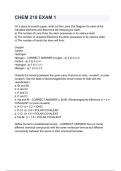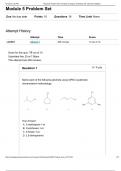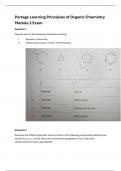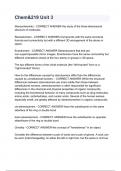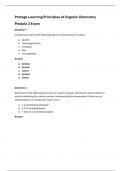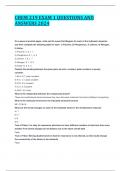Chem 219 Study guides, Class notes & Summaries
Looking for the best study guides, study notes and summaries about Chem 219? On this page you'll find 411 study documents about Chem 219.
Page 2 out of 411 results
Sort by
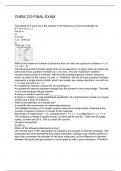
-
CHEM 219 FINAL EXAM Q&A 2024
- Exam (elaborations) • 13 pages • 2024
-
- $13.49
- 1x sold
- + learn more
The speed of a wave (c) is the product of its frequency (ν) and wavelength (λ). E = hv = h x c / λ nm to m or m to nm 1 m / 10^9 nm or 10^9 nm / 1 m What is the maximum number of electrons that can have the quantum numbers n = 3, ℓ = 2, mℓ = -2? The Pauli exclusion principle states that no two electrons in a given atom can share the same set of four quantum numbers (n, ℓ, mℓ, ms). This set of quantum numbers contains three quantum numbers, with the only missing quantum num...
CHEM 219 EXAM 1 ALL QUESTIONS WITH COMPLETE SOLUTION.
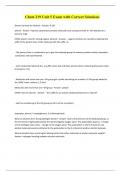
-
Chem 219 Unit 5 Exam with Correct Solutions
- Exam (elaborations) • 10 pages • 2024
- Available in package deal
-
- $11.49
- 2x sold
- + learn more
Chem 219 Unit 5 Exam with Correct Solutions Generic formula for alcohols - Answer -R-OH phenol - Answer -hydroxy-substituted aromatic molecules (any compound with an -OH attached to a benzene ring) IUPAC system rules for naming organic alcohols - Answer -- organic alcohols are named by replacing the suffix of the parent chain of the molecule with the suffix -ol - The parent chain is numbered so as to give the hydroxyl group the lowest possible number. (examples: 1-propanol, and cyclohexan...
CHEM 219 Module 5 Problem Set: Principles of Organic Chemistry with Lab-2021-Gallaher
Portage Learning Chem 219 Principles of Organic Chemistry Module 2 Exam
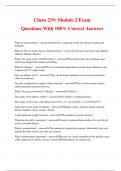
-
Chem 219: Module 2 Exam Questions With 100% Correct Answers
- Exam (elaborations) • 12 pages • 2024
- Available in package deal
-
- $12.49
- 1x sold
- + learn more
Chem 219: Module 2 Exam Questions With 100% Correct Answers What are hydrocarbons? - answerMolecules composed of only the elements carbon and hydrogen What are the two major classes of hydrocarbons? - answerAromatic (benzene) and aliphatic (alkanes, alkenes, alkynes) What is the main source of hydrocarbons? - answerFossil fuels like coal, petroleum, and natural gas obtained by mining and drilling. What are Alkanes? - answerThey are saturated hydrocarbons because their skeleton is only c...
Portage Chem 219 Unit 3, Organic Chemistry Module 3, Final Exam CHEM 219, CHEM 219 EXAM 1
Portage Learning Principles of Organic Chemistry Chem 219 Module 3 Exam
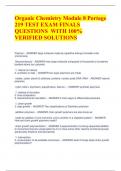
-
Organic Chemistry Module 8 Portage 219 TEST EXAM FINALS QUESTIONS WITH 100% VERIFIED SOLUTIONS
- Exam (elaborations) • 15 pages • 2023
-
Available in package deal
-
- $10.99
- 12x sold
- + learn more
Organic Chemistry Module 8 Portage 219 TEST EXAM FINALS QUESTIONS WITH 100% VERIFIED SOLUTIONS Polymer - ANSWER large molecule made by repetitive linking of smaller units (monomers) Macromolecule - ANSWER very large molecule composed of thousands of covalently bonded atoms (ex: polymer) 1. natural (in nature) 2. synthetic (in lab) - ANSWER two ways polymers are made rubber, carbs: starch & cellulose, proteins, nucleic acids DNA, RNA - ANSWER natural polymers nylon, teflon, sty...
QUESTIONS AND ANSWERS

Do you wonder why so many students wear nice clothes, have money to spare and enjoy tons of free time? Well, they sell on Stuvia! Imagine your study notes being downloaded a dozen times for $15 each. Every. Single. Day. Discover all about earning on Stuvia

